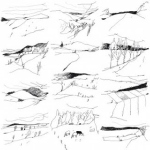|
|
 |
Dusted Reviews
Artist: Lawrence Album: Until Then, Goodbye Label: Mule Musiq Review date: Dec. 10, 2009 |

|
|
|
 |
There’s something comforting in the Austrian writer Thomas Bernhard’s misanthropy. His sentences are so brutal and uncomplex that they somehow evade understanding. Or, at least, demand that the reader pay more attention to the characters’ despair than they can reasonably be expected to. A middle-distance gaze imposes itself, where the reader’s eyes skate across the page rather than plunge into the icy nihilism, a sort of ego-triage that anyone who’s read French Theory can appreciate.
Lawrence’s new album, Until Then, Goodbye, is a current of winter air that feels homey rather than frigid, and likewise offers up its depths willingly. The tone of the thing contains more longing than despair, an ambivalence communicated through an easy alliance between deep house and Reichian minimalism, buffeted by gusts of ambient.
The last full-length Lawrence, a.k.a. Peter M. Kersten, was responsible for came out under his dance alias, Sten. I don’t remember having much of an affective relationship with The Essence when I wrote about it for this site, but upon re-listening, I was struck by how many details had emerged in its incubation period. Although the work belongs on the dancefloor, it is as carefully shaded as the more overtly emotive work from Pantha du Prince, the only other producer working this particular kind of joy-in-gloom. While Lawrence has bled some of the energy behind the kick on Until Then, Goodbye, tracks like "Jill" and "In Your Eyes" have oonce oonce underpinnings. Other tracks have less overt structural elements, but all of the workouts here feel thought-out and focused. Even at its most abstract, as on the interlocking marimba of "Father Umbrillo," the album conveys a clear sense of its identity: mood music that doesn’t dissolve into Pop Ambient fizz.
While the adjective "moody" applies to some of the music here, part of the album’s strength is that it feels somehow incidental. Bernhard’s characters spew so much venom that their jeremiads have a music of their own, not divorced from but independent of their content. "Father Umbrillo" has the quality of automatic speech, or a self-generating entity. Until Then, Goodbye seems best listened to over your shoulder like advice you know you can ignore safely. Unlike the granular clouds that make for the ambient of Mokira’s Persona or Elm’s Nemacatacoa, Lawrence presents the listener with well-defined, smooth, rhythmic surfaces meant to lose their sharpness.
So, while the act of skating over the surface of this music has little to do with avoiding suffocating darkness, it has a similar effect as in Bernhard’s writing. The mind creates new patterns and connections on top of what’s being offered. In a way, it’s opposed to the idea of deep listening; the suggestion is that instead of fleeing from distraction, we can use it to produce states that can’t be achieved any other way. Part of the appeal of Until Then, Goodbye is the way it muddles the expectations that come packaged with genres. Lawrence keeps slipping between faceless formalism and near-romantic self-assertion between and within releases. This record is as exceptional as it is humble.
By Brandon Bussolini
|







